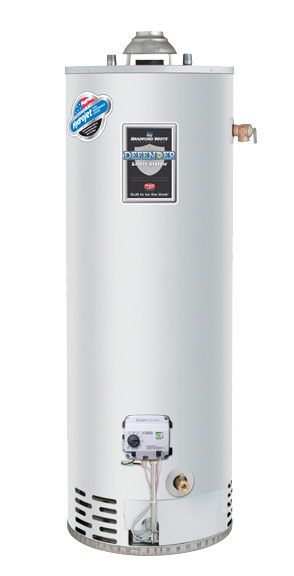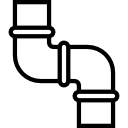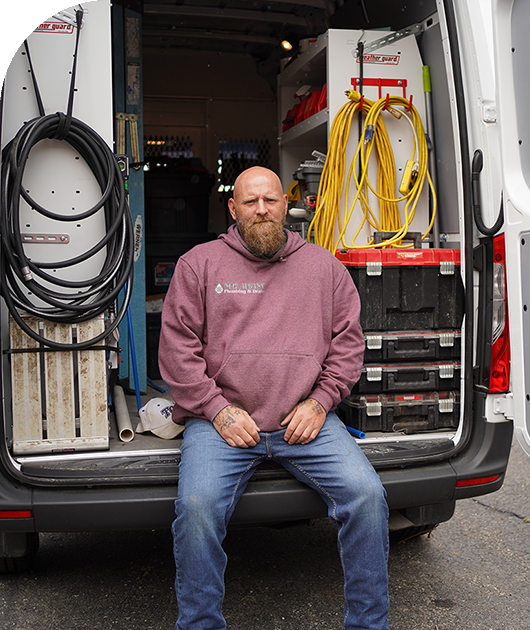Gas Water Heaters
Gas Water Heater Repair, Maintenance & Installation Services in New Albany, OH
In the Greater Columbus area, electric water heaters are a popular option for homeowners, but gas water tanks are also a trendy fuel choice. A lot of home appliances are powered by natural gas, ranging from stoves to ovens to clothes dryers, so it is no surprise that people would turn to gas for heating their home’s water supply as well. The low cost of gas also explains why so many prefer to power their home appliances. Another reason for this preference is that gas heats water faster than electricity and also has a faster recovery time than its counterpart.
One of the major factors to consider when determining if a gas water heater is right for you is that you need to look at whether or not gas is available to you. Installation of a gas water heater is a very affordable fuel option to switch over to if there are gas appliances already in the home. In some areas, however, gas might not be the best viable option, especially if you don’t have gas lines running near your residence. Whatever be the case, calling the assistance of a professional is imperative. Trust the experts of New Albany Plumbing & Drain to assist you in determining the best gas water heater for you.

Gas Water Heaters
How Gas Water Heaters Operate
The principle behind how a gas water heater functions is called convection in physics. Convection is a law that defines how heat rises. With gas water heaters, the cold water is supplied to the tank through a cold water supply line that fills the tank with a constant supply of cold water. A gas burner located below the sealed task then supplies heat to the dense cold water at the bottom of the tank. When the water warms up, it rises into the tank, where the hot water discharge pipe draws it off to provide hot water wherever it is needed. The hot water discharge pipe is a lot shorter than the dip tube because its job is to funnel off the most scalding water, which is always at the top of the tank.
The gas burner, which is the source of heat for the gas water heater, is controlled by a control valve, pressure relief valve, drain valve, vent hood, and gas regulator assembly mounted on the side of the water heater. This gas regulator includes a thermostat that regulates the temperature of the water in the tank; this is achieved by turning the gas burner on and off as necessary to properly maintain the set temperature of the water.
New Albany Plumbing & Drain
Benefits of Gas Water Heaters
Flow Rates in Gas Water Heaters
Condensing Water Heaters
Natural Gas
When looking for a new home in the United States nowadays, natural gas availability is considered to be one of the most important factors. Converting to gas provides a number of benefits, including cheaper heating costs and greater convenience. Because it is a more dependable, clean, inexpensive, safe, and efficient energy source, natural gas has become the fuel of choice for many homeowners. Natural gas has a number of benefits, including lower utility bills and a higher selling price when you put your home on the market. The use of gas for heating reduces the total need for and consumption of electricity. Additionally, natural gas supplies are more reliable than electricity. Hence, your gas supply is unaffected by a power failure.
Gas Heats Up Fast
Water heaters that use gas are twice as speedy as those that use electric hot water tanks. As a bonus, they are more efficient than electric models, ensuring that your hot water supply is refreshed promptly and constantly at all times. To put it another way, gas heaters are preferable to electric heaters for large businesses or households that require a lot of hot water. As a result, gas heaters are the preferred choice for large businesses and households that consume a lot of hot water, as they can quickly heat the water to the desired temperature.
Friendly Technicians
We can guarantee that you will receive the best care possible, as our team is filled with men and women who are not only friendly and respectful but absolute experts in their field.


24/7 Emergency Services
We are here for you! You can reach out to us at any time: on the weekends, in the night-time, on holidays, etc. We provide service around the clock!

We’re Licensed & Insured
You can put your trust in us and our services. Our company is licensed, insured, bonded, and our experts are qualified to work on gas lines and other dangerous equipment.


New Albany Plumbing & Drain
We Install Gas Water Heaters in New Albany, OH
We always advise speaking with our professional plumbers and expert water tank technicians while making a decision to help you determine the right style of heater best suited for your home or business. There are tankless heaters, storage tank heaters, and other categories of water heaters fueled by natural gas, propane, and electricity. Deciding what hot water system works for you will be determined majorly by the size of your structure (the available space for the heater). Making a wrong decision may result in insufficient hot water for your home and office use, and you may find yourself having to place your system far too soon. All this can be avoided by working with a professional that has years and years of experience to select your water heater; it can save you some hassles, headaches, and money. Call New Albany Plumbing & Drain today at (614) 245-3319 for professional assistance.


FAQ
Frequently Asked Gas Water Heater Questions
The New Albany Plumbing & Drain team is dedicated to assisting customers in identifying a long-term solution that will enable them to live comfortably in their homes. Please do not hesitate to contact us at (614) 245-3319 if you have any questions or concerns.
Why don't I have hot water?
Ensure that your gas supply is adequate before you begin troubleshooting your gas water heater; obstacles, a gas deficit, or the main gas valve may be blocked. If hot water suddenly becomes cold, it’s possible that the tank’s capacity has been exceeded. Wait for the water heater to recover if this is the case. The sooner you get in touch with us, the better.
Why is my water heater leaking?
Having water around or dripping from a water heater indicates leaking. As soon as you notice the water seeping out of the bottom of your tank, it’s time to get a new water heater installed.
What size water heater do I need?
Water heaters with tanks have been regarded as the best option for households with a lot of space. Tank water heaters, on the other hand, come in a variety of sizes and bearing capacities. As a general rule, a water heater with a tank that can contain more than 50 to 80 gallons of water should be installed in order to meet the water heating needs of a family of four or more. As an alternative, those who live in small homes with only one or two other people will benefit from an appliance with a 23-36 gallon capacity. In contrast, if you’re installing a tankless water heater, the flow rate of the system is more significant than the size of the unit (an added advantage of tank-less water heaters is that they are always fairly small and therefore relatively easy to access.) The flow rate of a tankless heater is measured in gallons per minute (GPM), or gallons per second. Because of this, the larger your home is, the more GPM your tank-less system will need to pump out.

